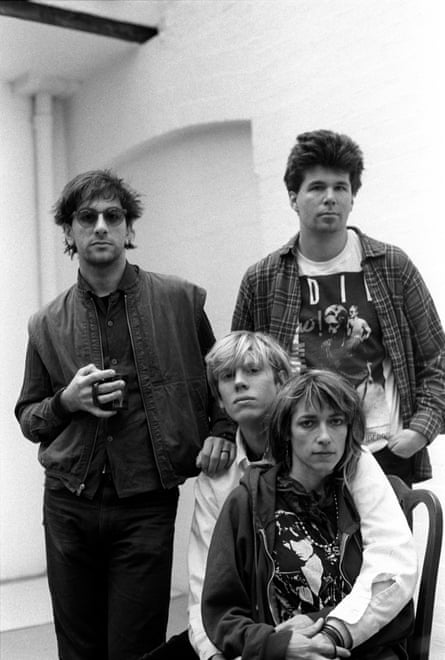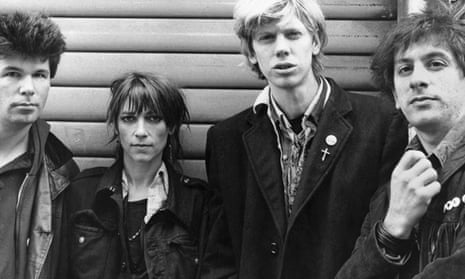WE ARE AN industrial band. We are an industrial band.
In a girder-strewn workshop in the bowels of New York’s Roseland Theatre, Sonic Youth’s Thurston Moore is detailing the band’s new direction with a stunning impersonation of a Dalek. As usual, he’s talking his own brand of amiable, goofed-up bullshit.
There was a time – around the release of Death Valley ’69 – when Sonic Youth seemed a spooky bunch, holed up with Manson’s ghost, burning pyres of sacred American guitar totems and drinking blood from tankards moulded from old MC5 records. Since then, the band’s scheme has been more fully revealed, with Sonic Youth emerging as a fusion of the comic and the cataclysmic.
For, while this band have revolutionised guitar music and included incidental guitar and amplifier noises more integrally than anyone has before, they’ve balanced this serious intent with a more flippant side. It was this that had them nominating Dinosaur Jr’s J Mascis for president, knocking out destructive remixes of Madonna records and laying down their own version of Moby Dick – no, not Led Zep’s drum onslaught, but an ambient piece featuring whale noises. As they admitted in their last Sounds interview, Sonic Youth’s mix of innovation and rock-culture referencing has made them the kings of the US avant-guitar scene.
But Sonic Youth’s daydream nation looks increasingly like some punky reservation. No band has emerged in the wake of Dinosaur to establish themselves as a world-class standard bearer for Sonic Youth’s spirit, and their music and ideas remain too leftfield to break out, REM-style, into the US mainstream. It may be crass force of habit to assume a band’s main mission should be to increase their size and status but, even if Sonic Youth wanted to go for gold, it’s difficult to see how they’d facilitate it.
And while the US guitar dynamic has reached a plateau, the Brit pop scene has undergone an explosion as a horde of post-Mondays guitar bands have built dance culture into their act. It’s this state of affairs that had Factory’s Tony Wilson using a recent New York New Music Seminar panel discussion to plug his own band and wind up the yanks: Wake up America, you’re dead, sed Tone.
Sonic Youth are equal parts amused and bemused by the new UK thang. Thurston ridicules it with his usual brand of nonsense, while axeman Lee Ranaldo and drummer Steve Shelley seem genuinely antagonistic to the very idea. Kim Gordon, on the other hand, is more curious than anything.
“Is it true that Tony Wilson believes the Manchester thing is bigger than punk?” she asks. “That’s strange, because it’s not really confrontational in any way. It’s escapist, isn’t it? In some ways, it seems the total opposite of punk.”
“It could be the new New Romantic thing,” says laff-a-minute Thursty. “Has Tony Wilson ever worn a pirate outfit? Hey, Tony Baloney, man, you’re just the new Paul Smith wannabe,” he sniggers, invoking the name of the Youth’s old label boss.
“This Manchester thing’s not a very popular subject with us. That stuff isn’t about music very much,” says Steve, hellbent on giving himself the same relation to Manc-beat that Rick Wakeman had to punk.
Meanwhile, Thurston continues the wind-up: “The whole Manchester/house thing is pretty much on a par with the lambada. It’s music that’s trying to be very subtle, but it’s kind of hard for us to see. There are a lot of homoerotic overtones in a lot of the Manchester bands. Bruce Pavitt of Sub Pop loves that kind of music. I took him to see Northside and he was like, ‘I’d rather be here than Boss Hog any day’. The homoerotic content is the kind of lads-together thing, that kind of pat-on-the-bum mateyness. It’s pretty interesting to see how music in Manchester has progressed over the years, particularly in the light of Joy Division and the Fall. One thing I notice now is the physicality of it – it’s a dance music, a functional music, but they all hold the microphone in a certain way, just above the head.”
Kim: “Yeah, it’s very formal. It’s almost like going to see one heavy metal band after another.”
Thurston: “The most interesting thing to me about all this Mancunian stuff is the way they use repetition for the sake of the artfulness of repetition. That’s one aspect of rock’n’roll that has often come out in Manchester. The Fall were always interesting that way.”
While Steve maintains his anti-Manc attack – “It is totally like the lambada. It’s contrived shit”, Thurston cheerfully admits that he’s heard precious little of the new Brit beat. Sonic Youth’s suspicion of all things baggy is really just an extension of their suspicion of the British music press.
Kim: “We haven’t seen it evolving over the past two summers in Manchester. That’s the problem with the British press. The press gets hold of it and then there’s all this hype and all of a sudden a new scene’s formed. It may help the bands, but it’s hard to take it seriously.”
Lee: “Bands rise and surface in the British press so regularly that, for the most part, unless something really catches my ear, I feel like, ‘Oh, if they’re still around in two years, I’ll see what they’re up to.’ With a band like Happy Mondays it’s also a cultural thing. It’s not anything that interests us. In England, maybe it’s interesting in what they do and where they come from socially, but here it doesn’t mean that much.”
Thurston: “Take a band like My Bloody Valentine, who would totally change their musical style from one day to the next. To us that’s like, forget it, just cross it out. That’s why we’re so cynical about bands who jump sound bandwagons. I mean, if the Soup Dragons lived in New York, would they all be vogueing? Man, people have been into disco in New York for years and, in the Italian sections of town, people have been wearing flares for a lot longer than Stone Roses.”

While denying rumours – as it happens, totally fabricated ones – that Brix Smith is to join Sonic Youth (“Brix? We’d rather audition Dolly Parton”), the band react surprisingly kindly to David Bowie’s interest in the band. Davy first chipped in with the “Branca Sonic” line on the Tin Machine album and then talked about setting up a label for his favourite bands – “like Sonic Youth and the Pixies”.
Thurston: “That’s pretty cool. It wasn’t really something you’d think about when you were 14, listening to his records. He’s always been into newer bands in his own way. He was on to Devo and Pere Ubu before most people.”
Kim: “I wish I heard more of that in his music.”
Thurston: “Why? His music has always been kinda unique to him.”
Kim: “Yeah, but it’s become so generic.”
With Tin Machine, Bowie seemed to be grasping for some kind of late-80s American guitar dynamic and totally failing to connect with it.
Thurston: “Yeah, a lot of people you really liked when you were 14 are totally horrendous now. I mean, Lou Reed. Who would ever have thought he would become so fuckin’ lame? Just that fuckin’ hair-do. I mean, we’re no fashion gurus, but hair is kinda important.”
The inside sleeve to Sonic Youth’s Goo album bears the frightfully insurrectionary slogan Smash The PMRC, but they aren’t too upset by the fearsome anti-rock forces that’ve been aligned against Judas Priest in recent weeks.
Thurston: “I’m totally into the Priest thing. It’s the only dialogue we have with the satanic forces right now. I notice you don’t have such anti-rock organisations in Britain, but you’re the guys who have nude D-cups in your newspapers.”
Kim: “I was reading in 17 – a fashion magazine – that in some schools they’ve decided they have to have Satan-watchers.”
Thurston: “Yeah, America’s pretty much into it, because the devil lives in Texas.”
Kim: “Yeah, in Gibby [Haynes]’s butthole.”
Thurston: “Say, are you anti-American? I think it’s pretty cool, I think people should be anti-American. After all, Britain did have the best band ever – the Beatles.”
Don’t worry, mate, we’re all on the same side now. Even the Ruskies are up for it, and Germany has the chance to be on the winning side for a change.
Kim: “Sure, we’re all going into world war three together.”
“Yeah, man, time to kick some towelhead ass. Fear of a towelhead planet, that’s what it’s all about,” guffaws Thurston, before abandoning his mock-tabloid tirade: “No, I kinda like the Arabs, myself.”
Sonic Youth’s imminent tour of the UK and Ireland (which begins in Dublin on Sunday) is accompanied by the Kool Thing single. They almost got LL Cool J, one of the song’s subjects, to appear in the video, but Cool didn’t quite make it. However, the video for the next 45, the Karen Carpenter tribute Tunic, has already been shot and that’ll feature no end of stars.
“We did it at the university in Boston,” explains Thurston. “Actually, in the same place that Dinosaur did one of their videos. It’s got a lot of cutout figures and puppets – a little like Sgt Pepper’s. We all play different people. I play Richard Carpenter, Kim’s Karen, Lee’s Elvis and Steve’s Dennis Wilson.
“Steve had to be Dennis, because he’s the only one in the band who’s ever surfed. How could anyone play a Beach Boy without having surfed?”
© Roy Wilkinson, 1990

Comments (…)
Sign in or create your Guardian account to join the discussion